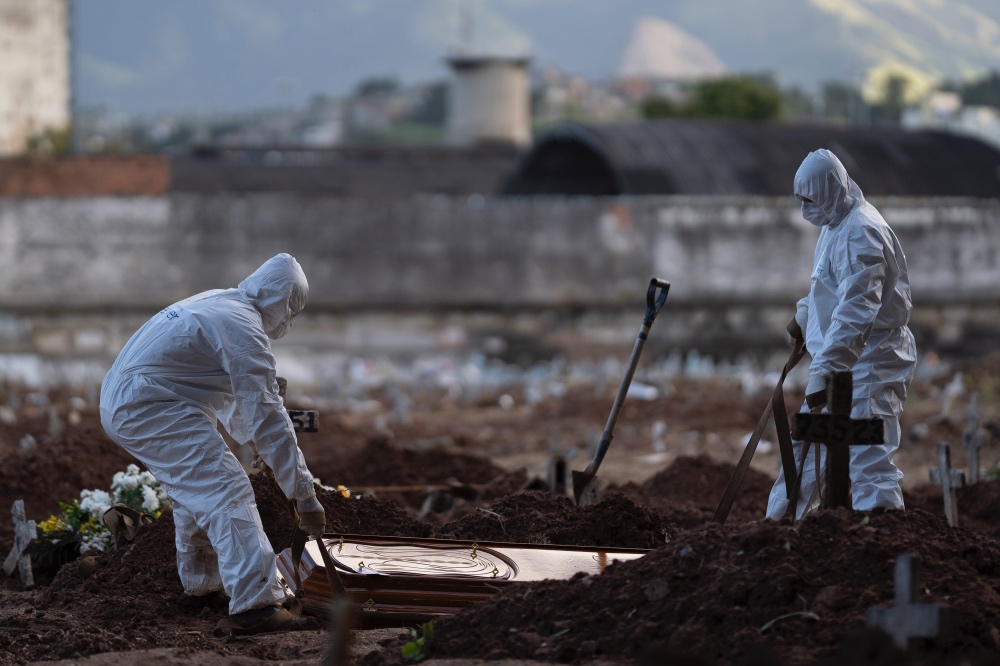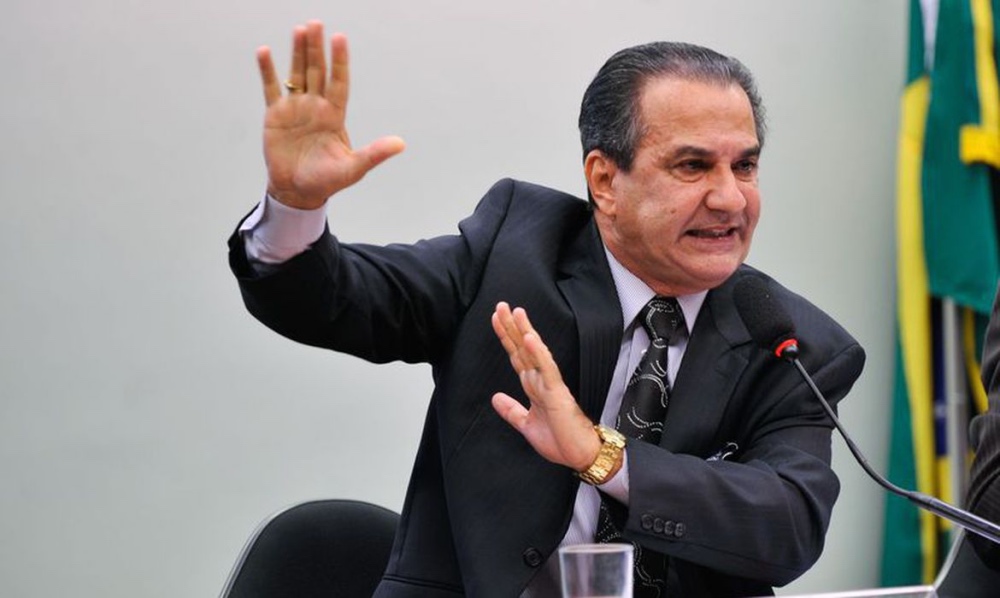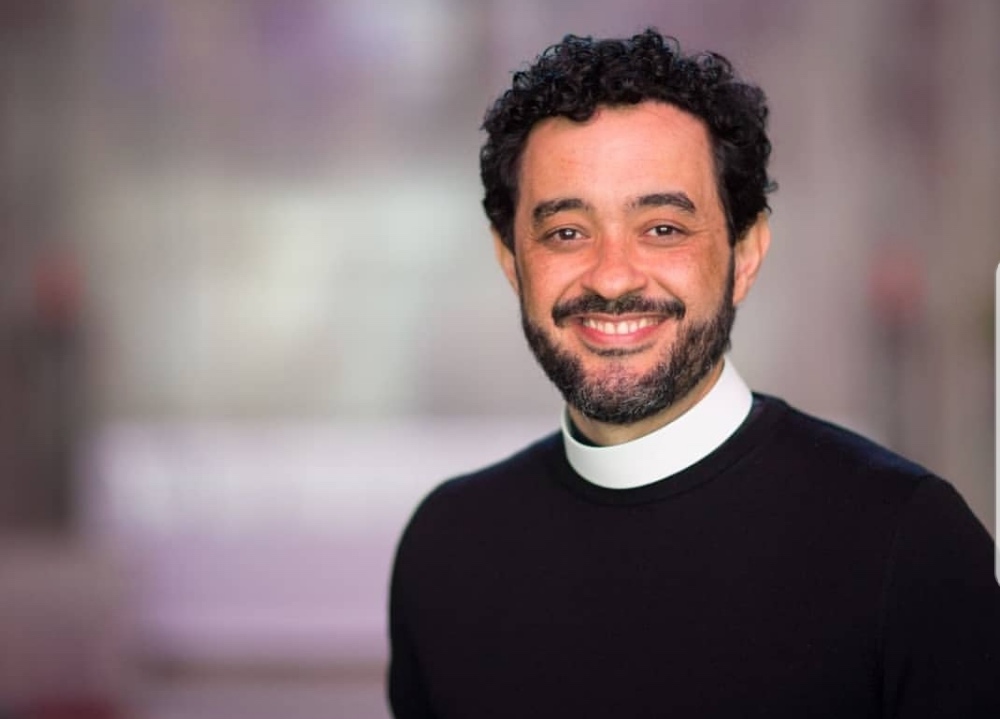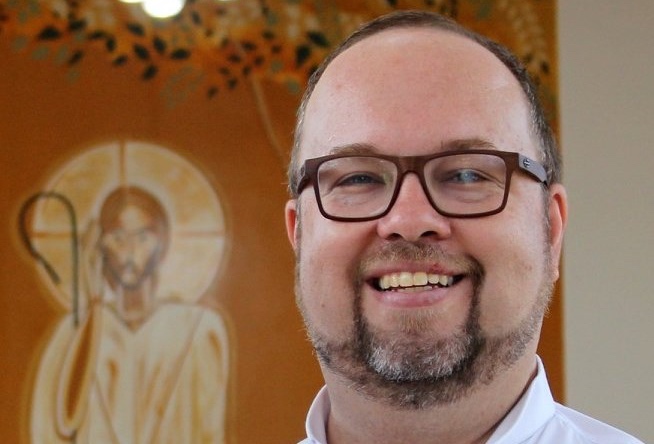
EDUARDO CAMPOS LIMA reports from Brazil on how church leaders are responding to the coronavirus pandemic…
São Paulo, Brazil
While the number of confirmed cases of COVID-19 continues to grow exponentially in Brazil, with more than 13,000 reported deaths and the collapse of the healthcare system in several regions, growing numbers of people have been leaving isolation and going back to normal life.
Denialism originates in many fronts, with President Jair Bolsonaro himself being a major source of misinformation. But such discourse has been particularly strong among some Christians.

Cemetery workers wearing hazmat suits bury the coffin containing the remains of 71-year-old Neide Rodrigues Rosa, who died from the new coronavirus according to her son Sergio Rodrigues, in Rio de Janeiro, Brazil, Friday, 8th May. PICTURE: AP Photo/Leo Correa.
Since the outbreak reached the South American country, top evangelical Protestant leaders have manifested scepticism about the seriousness and the extent of the disease. For a considerable period, their public recommendations for large masses of churchgoers was to ignore media reports and go on with daily activities – including attending church celebrations.
That was the case of Bishop Edir Macedo, the billionaire founder of the Universal Church of the Kingdom of God, who published a video on 15th March in which he told people not to worry with the novel coronavirus.
Since the outbreak reached the South American country, top evangelical Protestant leaders have manifested scepticism about the seriousness and the extent of the disease. For a considerable period, their public recommendations for large masses of churchgoers was to ignore media reports and go on with daily activities – including attending church celebrations.
“This is one of Satan’s tactics. Satan works with fear, terror. He works with doubt. And when people are terrified, frightened, in doubt, they get fragile, weak, and susceptible. Any light wind becomes pneumonia for them,” he affirmed. He pointed out that there were “economic interests” behind what he called the “coronavirus campaign”. Macedo removed the clip from his social media shortly after, but the video had already gone viral.
Pastor Silas Malafaia, the founder of the church Victory in Christ – a branch of the Assembly of God – has been another loud voice against social distancing measures in Brazil. On 2nd April, Twitter suppressed seven of his posts in which he had raised doubts on the efficacy of the quarantine to prevent the further dissemination of the virus. In one of his messages, he said that the “Brazilian people is being fooled” and falsely claimed that “there isn’t any coronavirus patient hospitalised in intensive cares unities.”
Both Macedo and Malafaia are outspoken supporters of the President, who has always rejected the idea of federally implementing social distancing measures. Bolsonaro has criticised state governors who decreed restrictions to social and economic activities and defended the so-called vertical isolation, in which only people who are part of high-risk groups – especially the elderly – should be isolated.
Such ideas seem to have a powerful resonance among many Christians in Brazil. In the opinion of Francisco Gomes Pinheiro, a pastor of the Brazilian Baptist Convention, the closing of commerce and churches imposed in many regions in the country was “unnecessary”.
“We didn’t need to get to such a critical point. Prevention preceded the [pandemic] situation itself. I agree with Pastor Silas Malafaia and many others who believe those measures weren’t needed,” he told Sight.
For Pinheiro, there’s no “veridical information available [on the pandemic], so people are not able to develop their own ideas about it.”
“Fear is disturbing. If you incentive people to be frightened, they end up getting troubled and avoid exposing themselves,” he declared.

Pastor Silas Malafaia, the founder of the church Victory in Christ – a branch of the Assembly of God. PICTURE: Fabio Rordigues Pozzebom/Agência Brasil.
Although such denialist stances are more visible among massive evangelical churches as the UCKD and the Assembly of God, the same ideas can be seen among Catholic groups and reformed churches.
“Today, Christianity faces the challenge of fundamentalism all over the world,” notes Francisco Borba Ribeiro Neto, coordinator of the Center of Faith and Culture of the Pontifical Catholic University of São Paulo. “Fundamentalists see a world full of danger and occult enemies and believe that by strictly observing a set of norms and doctrines they will be safe from evil.”
According to Professor Ribeiro Neto, the pandemic reinforces such a “terrifying image of today’s world” and, at the same time, presents scientific information – and not traditional values – as the adequate instrument to defeat danger.
“Therefore, a competition between science and fundamentalism emerges,” he says.
“Today, Christianity faces the challenge of fundamentalism all over the world. Fundamentalists see a world full of danger and occult enemies and believe that by strictly observing a set of norms and doctrines they will be safe from evil.”
– Francisco Borba Ribeiro Neto, coordinator of the Center of Faith and Culture of the Pontifical Catholic University of São Paulo.
Reformed Protestant churches and Catholics have an ancient and already consolidated relation with science and reason. In general, their leaders are, therefore, less susceptible to such dichotomisation, Ribeiro Neto explains. But a large proportion of Brazilian evangelicals are Pentecostal or Neo-Pentecostal with many subscribing to the so-called prosperity theology, which establishes almost magical relations between personal success and the individual fulfillment of church obligations.
“Those reactions are influenced by society’s ideological polarisation,” argues Ribeiro Neto. “There’s a strong connection between the denial of social distancing measures and the denial of climate change.”
In this sense, President Bolsonaro and the pastors who support him appear to many evangelicals as populist leaders whose “instinctive opinion” would be more accurate than the technical studies of the international scientific community, says Ribeiro Neto. That’s why their anti-quarantine speech is able to reach so many people – with its corresponding impact on the spread of the virus in Brazil.
There are some Christian leaders who are attempting to ensure society takes the necessary steps to combat the disease, while at the same time taking care of their flock.
“The most important thing for us is life, not the economy,” Lutheran Pastor Inácio Lemke, who is the president of the National Council of Christian Churches from Brazil, tells Sight. “Our recommendation has always been to respect the World Health Organization’s guidelines.”
Discourses that attempt to minimise the risks of the pandemic by saying that the disease only kills the elderly are profoundly anti-Christian, Pastor Lemke adds.
“Those ideas worry me very much. Elderly people are not disposable. And they can’t be secluded in order to get the economy back, as some people want,” he says.

Anglican Rev Arthur Cavalcante. PICTURE: Supplied
Amid the confusion created by the conflicting ways President Bolsonaro and state governors are dealing with the crisis, some churches had to evaluate the situation and take for themselves the decision to suspend celebrations and services in mid-March.
“The Anglican Church is connected to other churches around the globe, so we knew what was happening abroad,” says Rev Arthur Cavalcante from São Paulo. “On March 22, we decided to close our temples.”
Since then, the Anglican Church has been reaching people through social media as well as by phone. Churches will remain closed until 15th May at least, Rev Cavalcante explains.
The Catholic Bishops’ Conference also stopped public Masses in March, telling people to stay home. But in the past few weeks, some states have allowed some economic and social activities to restart including religious services. A few dioceses and parishes, therefore, are active again, but with many restrictions.

Fr Jean Poul Hansen, of the small city of Campanha, in Minas Gerais State. PICTURE: Supplied.
“According to the WHO, we haven’t reached the top of the pandemic curve. We shouldn’t put everybody in danger just because a few people want to have communion, but are incapable of a real sense of community.”
– Fr Jean Poul Hansen
“I don’t think it’s the right time for that,” says Fr Jean Poul Hansen, of the small city of Campanha, in Minas Gerais State. “According to the WHO, we haven’t reached the top of the pandemic curve. We shouldn’t put everybody in danger just because a few people want to have communion, but are incapable of a real sense of community.”
Fr Hansen said that he felt inspired since the beginning of the pandemic by Pope Francis’ attitude. “He isolated himself, but kept celebrating, spreading messages, and addressing the most pressing problems.”
Fr Hansen has been using social media to talk to people, celebrate daily masses, and even guide the members of his parish to a home celebration of Easter.
“The Latin American Church has a long-standing tradition of defending life. We weren’t in doubt if we should promote social distancing measures or not,” he tells Sight.
For Rev Arthur Cavalcante, Christians in Brazil have to urgently go back to Jesus’ speeches against the manipulation of faith by political and economic interests.
“We have big corporations of faith, as I call them, which depend on their audience to obtain donations. What they’re really discussing is their financial ambition…We must leave aside the religiosity of the clergy who is there for the sacrifices and rescue the religiosity of the prophet.”





